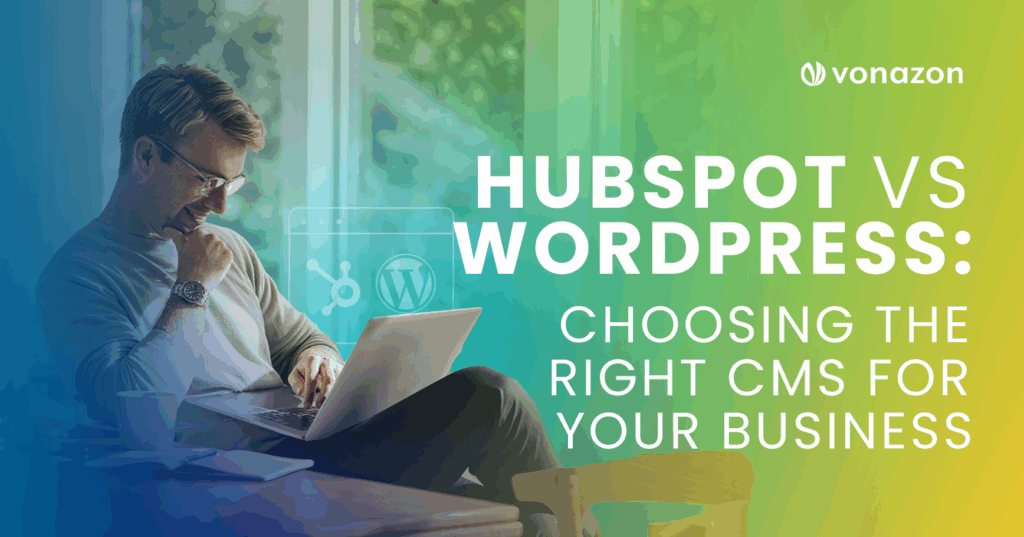Hubspot vs wordpress Choosing the Right CMS for Your Business
If you’ve ever been stuck in a “HubSpot vs WordPress” debate, you know it feels a little like arguing over iPhone vs Android. Both platforms are wildly popular, both have their loyalists, and both can run your website beautifully, but in very different ways. The real question isn’t which is “better” overall, but which is a better fit for you.
So, let’s unpack how HubSpot CMS vs WordPress stacks up. We’ll look at customization, ease of use, security, integrations, analytics, pricing, and where each one shines.
Why This Comparison Matters
Content management systems (CMS) are the backbone of modern business websites. The decision between the two should center around the platform’s alignment with your business goals. Do you need infinite customization? Do you want a marketing-first ecosystem? Do you need your website to connect seamlessly with sales and service teams? These are the levers that tip the scale.
HubSpot CMS:
What It Brings to the Table
HubSpot’s CMS Hub was designed for marketers who want a powerful, all-in-one platform that ties directly into their CRM, automation, and reporting tools.
Strengths of HubSpot CMS

- All-in-one growth ecosystem: HubSpot CMS connects directly with HubSpot CRM, Marketing Hub, Sales Hub, and Service Hub. That means your website is fully synced with your pipeline and customer journey.
- Ease of use: Drag-and-drop editing, flexible themes, and smart content personalization make it simple for marketers to update without needing a developer.
- Ease oBuilt-in security: SSL, global CDN, WAF, and 24/7 threat monitoring are included. You don’t need to manage plugins for basic protection.
- Smart reporting: You can tie web activity directly to revenue since every page, form, and CTA is automatically tracked against contacts in your CRM.
Considerations
Less open-ended customization:
While HubSpot has custom modules and themes, it doesn’t have the limitless open-source community of WordPress. If you want something extremely niche or experimental, you may feel constrained.
Pricing:
HubSpot CMS is not free. Plans start at $25/month for Starter, with Professional at $400/month and Enterprise at $1,200/month. The trade-off is you’re also getting hosting, security, and analytics bundled in.
WordPress:
What It Brings to the Table
WordPress is the world’s most widely used CMS for a reason. If you ask us, that reason is flexibility. Born as a blogging platform, it has grown into a full-scale CMS that can handle everything from personal niche blogs to Fortune 500 websites.
Strengths of WordPress

- Open-source flexibility: With 59,000+ plugins and countless themes, you can build just about anything on WordPress - from eCommerce stores to membership platforms to custom applications.
- Cost-effective entry: The core software is free. You’ll pay for hosting, security, and premium plugins, but you can control costs depending on your setup.
- Huge community: WordPress has a massive developer ecosystem. If you need a niche integration, someone has probably built it.
- Ownership: You fully own your website, database, and hosting environment. For some businesses, this autonomy is a must.
Considerations
Maintenance required:
You (or your IT/development team) are responsible for updates, plugin compatibility, backups, and security patches. Neglect this, and you’re vulnerable to a host of issues. Outdated plugins can break functionality or slow down your site, missed security patches can open the door to hackers and malware, and skipped backups mean you could lose everything if something crashes.
Scattered ecosystem:
With plugins coming from thousands of different vendors, quality control isn’t guaranteed. One plugin update might play nice, while another could break your site layout or conflict with existing tools. Performance can vary wildly, and without careful management, you risk slow load times, buggy features, or even downtime.
Analytics are limited out of the box:
WordPress doesn’t come with built-in reporting that connects to your sales or marketing data. You’ll likely rely on Google Analytics or third-party tools, which don’t always tie neatly to your CRM. That means extra setup, custom tracking, and sometimes a messy handoff between platforms when you’re trying to answer simple questions.
HubSpot CMS vs WordPress
Here’s how they compare across the areas businesses care about most:
1. Ease of Use
HubSpot CMS
Built for marketers. Intuitive editing, drag-and-drop layouts, and native A/B testing.
VS
WordPress:
Easy enough for basic blogging, but managing custom functionality often requires technical skills or developer support.
2. Customization
HubSpot CMS
Flexible, but within HubSpot’s framework. Best for businesses that want personalization over total creative freedom.
VS
WordPress:
Endless customization. If you can dream it, someone can build it. But more complexity means more upkeep.
3. Security
HubSpot CMS
Fully managed by HubSpot with SSL, CDN, and 24/7 monitoring included.
VS
WordPress:
Depends on your hosting and plugin choices. Security is only as strong as the tools and practices you put in place.
4. Integrations
HubSpot CMS
Seamless integration with HubSpot’s ecosystem plus 1,000+ apps in the marketplace.
VS
WordPress:
Tens of thousands of integrations. More breadth, but quality varies.
5. Analytics & Reporting
HubSpot CMS
Native reporting tied directly to CRM and marketing performance. Great for measuring ROI.
VS
WordPress:
Relies on third-party tools. Can be powerful, but usually requires piecing together data sources.
6. Pricing
HubSpot CMS
Starts at $25/month with everything bundled. Professional and Enterprise tiers are pricier but include advanced features.
VS
WordPress:
Free core software, but hosting, maintenance, premium themes, and plugins often push total cost to $50–$300/month depending on scale.
Which One Fits Your Business?
Here’s the litmus test: If you’re a marketing- and sales-driven organization that wants everything under one roof, HubSpot CMS is likely your best bet. You’ll get a website that talks to your CRM, gives you advanced analytics, and doesn’t require constant patchwork maintenance.
If you’re a tech-savvy business that wants maximum flexibility and doesn’t mind rolling up your sleeves for maintenance (or paying a dev team), WordPress remains the most customizable, widely supported CMS out there.
Over 90% of companies believe a positive customer experience the main factor that drives loyalty. That’s where HubSpot CMS shines. However, WordPress still dominates with nearly two-thirds of the CMS market share. Clearly, there’s no single winner, only the right fit for your growth model.

Different Paths to the Same Goal
The HubSpot vs WordPress debate doesn’t crown a universal champion. It highlights different paths to the same goal: a website that drives growth.
HubSpot CMS offers simplicity, integration, and marketing intelligence in one neat package. WordPress gives you unmatched control, flexibility, and community support.
At Vonazon, we’ve helped businesses succeed on both platforms, but as a HubSpot Elite Partner, we’ve seen firsthand how transformative HubSpot CMS can be when paired with the right strategy. Contact our expert team if you’re curious about what the right move looks like for your team, we’re here to guide you through the decision.






